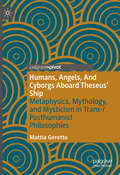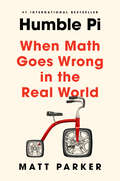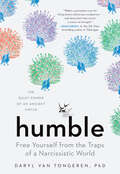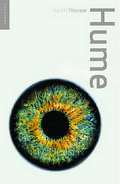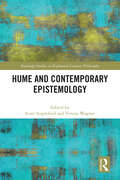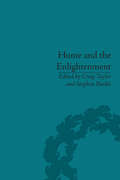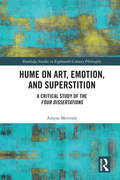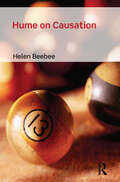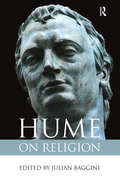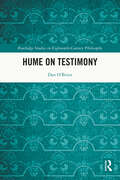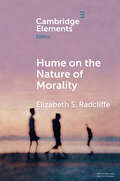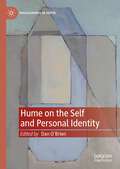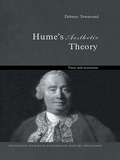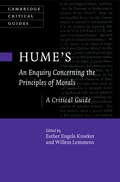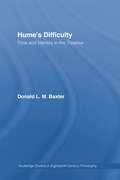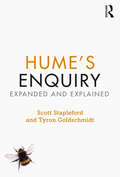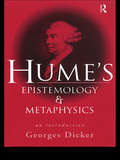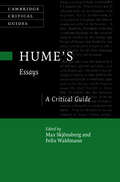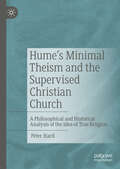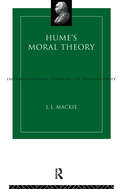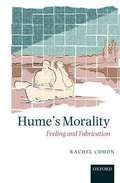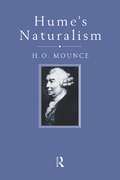- Table View
- List View
Humans, Angels, And Cyborgs Aboard Theseus' Ship: Metaphysics, Mythology, and Mysticism in Trans-/Posthumanist Philosophies
by Mattia GerettoThis book addresses the most suggestive themes of transhumanism and critical posthumanism by placing them in dialogue with classic problems of metaphysics, and with some great thinkers of the past (Bruno, Spinoza, and above all Leibniz). The main purpose of this comparison is to invite transhumanists and critical posthumanists to consider a highly complex problematic tradition rooted in the history of philosophy. This study also makes use of examples drawn from the history of mythology, angelology, and mysticism. At the same time, the book promotes dialogue between scholars of classical metaphysics and philosophy of religion, and the potential metaphysical/spiritual theories developed independently by transhumanist and posthumanist thinkers within an anti-dualist and naturalistic philosophical framework. The goal is to ‘enhance’ contemporary transhumanism and posthumanism by promoting the need to safeguard intelligence as a principle, without falling into the trap of a violent and egotistic metaphysics.
Humble Pi: When Math Goes Wrong in the Real World
by Matt ParkerAn international bestsellerThe book-length answer to anyone who ever put their hand up in math class and asked, &“When am I ever going to use this in the real world?&” &“Fun, informative, and relentlessly entertaining, Humble Pi is a charming and very readable guide to some of humanity's all-time greatest miscalculations—that also gives you permission to feel a little better about some of your own mistakes.&” —Ryan North, author of How to Invent Everything Our whole world is built on math, from the code running a website to the equations enabling the design of skyscrapers and bridges. Most of the time this math works quietly behind the scenes . . . until it doesn&’t. All sorts of seemingly innocuous mathematical mistakes can have significant consequences. Math is easy to ignore until a misplaced decimal point upends the stock market, a unit conversion error causes a plane to crash, or someone divides by zero and stalls a battleship in the middle of the ocean. Exploring and explaining a litany of glitches, near misses, and mathematical mishaps involving the internet, big data, elections, street signs, lotteries, the Roman Empire, and an Olympic team, Matt Parker uncovers the bizarre ways math trips us up, and what this reveals about its essential place in our world. Getting it wrong has never been more fun.
Humble: Free Yourself From The Traps Of A Narcissistic World
by Daryl Van TongerenA practical and philosophical deep dive into humility: how it can build confidence, foster honesty about our strengths and limitations, and help us achieve success Daryl Van Tongeren is a leading researcher on the science of humility. In Humble, he gives this unassuming trait a much-needed rebrand, explaining why the humble enjoy a more secure sense of self, handle challenges better, and, indeed, are often the people we like the most. That’s not to say Van Tongeren has mastered humility. (When he asked his wife to rate him on a scale from 1 to 10, she gave him a 4.) But in a world where narcissism is on the rise—where the shameless dominate social media and getting noticed is considered key to getting ahead—it’s not surprising that we all have a bit of work to do on our sometimes self-sabotaging egos. In its true sense, humbleness is the happy medium between self-denial and self-obsession: It grants the holder an accurate view of reality. By seeing where we have room to improve, we can grow. By admitting our doubts, we can learn. And by acknowledging our own worldview as one among many, we can truly connect with others despite our differences. A thought-provoking call to reexamine our values, Humble signals a paradigm shift—from the “self-esteem movement” run amok to a better world in which we lift up one another.
Hume
by James A. HarrisThis is the first book to provide a comprehensive overview of the entire career of one of Britain's greatest men of letters. It sets in biographical and historical context all of Hume's works, from A Treatise of Human Nature to The History of England, bringing to light the major influences on the course of Hume's intellectual development, and paying careful attention to the differences between the wide variety of literary genres with which Hume experimented. The major events in Hume's life are fully described, but the main focus is on Hume's intentions as a philosophical analyst of human nature, politics, commerce, English history, and religion. Careful attention is paid to Hume's intellectual relations with his contemporaries. The goal is to reveal Hume as a man intensely concerned with the realization of an ideal of open-minded, objective, rigorous, dispassionate dialogue about all the principal questions faced by his age.
Hume (Routledge Philosophy Guidebooks Ser.)
by H. W. NoonanThe father of modern scepticism and perhaps the most important English philosopher, Hume was lauded within his own lifetime as a pivotal figure of the Enlightenment. His 'naturalist' approach to a wide variety of philosophical topics resulted in highly original theories of perception, personal identity, causation, politics, morality, and religion, many of which were extremely controversial and continue to make waves today. Harold Noonan's excellent introduction to Hume presents Hume's ideas in their original context as well as discussing their relevance to contemporary philosophical debate. Can we argue that the design of the universe points to the existence of God? What makes us persons? What can we rationally believe in? Hume's voice, lucid and witty, is still an acute critic of human nature and Western thought.
Hume and Contemporary Epistemology (Routledge Studies in Eighteenth-Century Philosophy)
by Scott StaplefordThis is the first edited collection dedicated to demonstrating Hume’s relevance to contemporary debates in epistemology. It features original essays by Hume scholars and epistemologists that address a wide range of important questions, including the following: What does a Humean conception of knowledge look like? How do Hume’s understanding of belief and suspension of judgement bear on current debates about doxastic attitudes? Is there a Humean way of uniting reasons in the epistemic and practical domains? What is the proper role of reason at the foundations of ethics and epistemology from a Humean point of view? What contribution might an examination of Humean scepticism make to understanding of current sceptical hypotheses? Is Hume a hinge epistemologist? Does naturalized epistemology trace back to Hume? Does Hume have an ethics of belief? What can Hume contribute to virtue and vice epistemology? Some chapters try to bring historically accurate interpretations of Hume’s ideas into contact with current issues, while others will take ideas merely suggested by Hume and demonstrate their philosophical usefulness. Together, they demonstrate Hume’s enduring relevance for debates about knowledge, belief, inquiry and suspension, reasons, modal knowledge, scepticism, hinge epistemology, naturalized epistemology, the ethics of belief and moral epistemology, virtue and vice epistemology, and the epistemology of testimony.Hume and Contemporary Epistemology will be of interest to scholars and advanced students working on Hume, epistemology, and the history of philosophy.
Hume and the Enlightenment: The Unity And Purpose Of An Enquiry Concerning Human Understanding
by Craig Taylor Stephen BuckleWhile Hume remains one of the most central figures in modern philosophy his place within Enlightenment thinking is much less clearly defined. Taking recent work on Hume as a starting point, this volume of original essays aims to re-examine and clarify Hume's influence on the thought and values of the Enlightenment.
Hume and the Politics of Enlightenment
by Thomas W. Merrill"Methinks I am like a man, who having narrowly escap'd shipwreck," David Hume writes in A Treatise of Human Nature, "has yet the temerity to put out to sea in the same leaky weather-beaten vessel, and even carries his ambition so far as to think of compassing the globe. " With these words, Hume begins a memorable depiction of the crisis of philosophy and his turn to moral and political philosophy as the path forward. In this groundbreaking work, Thomas W. Merrill shows how Hume's turn is the core of his thought, linking Hume's metaphysical and philosophical crisis to the moral-political inquiries of his mature thought. Merrill shows how Hume's comparison of himself to Socrates in the introduction to the Treatise illuminates the dramatic structure and argument of the book as a whole, and he traces Hume's underappreciated argument about the political role of philosophy in the Essays.
Hume on Art, Emotion, and Superstition: A Critical Study of the Four Dissertations (Routledge Studies in Eighteenth-Century Philosophy)
by Amyas MerivaleThis book offers the first comprehensive critical study of David Hume’s Four Dissertations of 1757, containing the Natural History of Religion, the Dissertation on the Passions, and the two essays Of Tragedy and Of the Standard of Taste. The author defends two important claims. The first is that these four works were not published together merely for convenience, but that they form a tightly integrated set, unified by the subject matter of the passions. The second is that the theory of the passions they jointly present is significantly different—indeed, significantly improved—from that of the earlier Treatise. Most strikingly, it is anti-egoist and anti-hedonist about motivation, where the Treatise had espoused a Lockean hedonism and egoism. It is also more cognitivist in its analysis of the passions themselves, and demonstrates a greater awareness of the limits of sympathy and of the varieties of human taste. This book is an important contribution to the scholarly literature on Hume’s work on the passions, art, and superstitious belief.
Hume on Causation
by Helen BeebeeCausation is one of the most important and enduring topics in philosophy, going as far back as Aristotle. In this lucid and enthralling account, Helen Beebee covers all the major debates and issues in the philosophy of causation, making it the ideal starting point for those approaching the subject for the first time. Beginning with an introduction to the concept, the book examines the most significant philosopher of causation – David Hume – and assesses the problems of induction and necessary connection in light of his thought. Helen Beebee then investigates different theories of causation and challenges to the Humean approach. She considers the concepts of regularity, causal experience, necessity and essences. Throughout the book, she also critically discusses other key philosophers on causation, including J.L. Mackie, John Wright and Brian Ellis.
Hume on Religion
by Julian BagginiFirst Published in 2016. Routledge is an imprint of Taylor & Francis, an Informa company.
Hume on Testimony (Routledge Studies in Eighteenth-Century Philosophy)
by Dan O'BrienThis book is the first devoted to Hume’s conception of testimony. Hume is usually taken to be a reductionist with respect to testimony, with trust in others dependent on the evidence possessed by individuals concerning the reliability of texts or speakers. This account is taken from Hume’s essay on miracles in An Enquiry concerning Human Understanding. O’Brien, though, looks wider than the miracles essay, turning to what Hume says about testimony in the Treatise, the moral Enquiry, the History of England and his Essays. There are social aspects of testimonial exchanges that cannot be explained purely in terms of the assessment of the reliability of testifiers. Hume’s conception of testimony is integrated with his account of how history informs our knowledge of human nature, the relation between sympathy and belief and between pride and the conception we have of our selves, the role played by social factors in the judgment of intellectual virtue, and the importance Hume places on epistemic responsibility and the moral and personal dimensions of testimonial trust. It is not possible to focus on testimony without allowing other aspects of our nature into the frame and therefore turning also to consider sympathy, wisdom, history, morality, virtue, aesthetic judgment, the self and character. O’Brien argues that Hume’s reliance on the social goes deep and that he should therefore be seen as an anti-reductionist with respect to testimony. Hume on Testimony will be of interest to researchers and advanced students working on Hume and on early modern and contemporary approaches to the epistemology of testimony.
Hume on the Nature of Morality (Elements in Ethics)
by Elizabeth S. RadcliffeDavid Hume's moral system involves considerations that seem at odds with one another. He insists on the reality of moral distinctions, while showing that they are founded on the human constitution. He notes the importance to morality of the consequences of actions, while emphasizing that motives are the subjects of moral judgments. He appeals to facts about human psychology as the basis for an argument that morality is founded, not on reason, but on sentiment. Yet, he insists that no “ought” can follow from an “is.” He thinks that our motivation to justice must derive from our nature. Yet, he wonders how to explain why anyone would be motivated to follow rules when doing so does not further their personal interests. As an empiricist, his approach is descriptive, yet morality is prescriptive. This Element addresses these puzzles in Hume's moral theory, with reference to historical and contemporary discussions.
Hume on the Self and Personal Identity (Philosophers in Depth)
by Dan O’BrienThis book brings together a team of international scholars to attempt to understand David Hume’s conception of the self. The standard interpretation is that he holds a no-self view: we are just bundles of conscious experiences, thoughts and emotions. There is nothing deeper to us, no core, no essence, no soul. In the Appendix to A Treatise of Human Nature, though, Hume admits to being dissatisfied with such an account and Part One of this book explores why this might be so. Part Two turns to Books 2 and 3 of the Treatise, where Hume moves away from the ‘fiction’ of a simple self, to the complex idea we have of our flesh and blood selves, those with emotional lives, practical goals, and social relations with others. In Part Three connections are traced between Hume and Madhyamaka Buddhism, Husserl and the phenomenological tradition, and contemporary cognitive science.
Hume's 'A Treatise of Human Nature'
by John P. WrightDavid Hume's A Treatise of Human Nature (1739-40) presents the most important account of skepticism in the history of modern philosophy. In this lucid and thorough introduction to the work, John P. Wright examines the development of Hume's ideas in the Treatise, their relation to eighteenth-century theories of the imagination and passions, and the reception they received when Hume published the Treatise. He explains Hume's arguments concerning the inability of reason to establish the basic beliefs which underlie science and morals, as well as his arguments showing why we are nevertheless psychologically compelled to accept such beliefs. The book will be a valuable guide for those seeking to understand the nature of modern skepticism and its connection with the founding of the human sciences during the Enlightenment.
Hume's Aesthetic Theory: Sentiment and Taste in the History of Aesthetics (Routledge Studies in Eighteenth-Century Philosophy #Vol. 2)
by Dabney TownsendHume's Aesthetic Theory examines the neglected area of the development of aesthetics in empiricist thinking, exploring the link between the empiricist background of aesthetics in the eighteenth century and the work of David Hume.This is a major contribution to our understanding of Hume's general philosophy and provides fresh insights into the history of aesthetics.
Hume's An Enquiry Concerning the Principles of Morals: A Critical Guide (Cambridge Critical Guides)
by Esther Engels Kroeker Willem LemmensHume considered his Enquiry Concerning the Principles of Morals to be one of his best works. In it he offers his most elegant and approachable account of the origins and scope of morality. With the hope of reaching a broad audience, he argues that morality is neither rigid nor austere, but is rather a product of sentiments that all human beings share, and which they are naturally inclined to recognize and act upon. In this Critical Guide, a team of distinguished scholars discuss each section of the Enquiry, its place in Hume's philosophy as a whole, and its historical context; their topics include the nature of morals, talents and moral virtues, benevolence, sympathy, and the sources of moral disagreement. The volume will be valuable for scholars and advanced students working on Hume.
Hume's Difficulty: Time and Identity in the Treatise (Routledge Studies in Eighteenth-Century Philosophy #Vol. 7)
by Donald L.M. BaxterIn this volume--the first, focused study of Hume on time and identity--Baxter focuses on Hume’s treatment of the concept of numerical identity, which is central to Hume's famous discussions of the external world and personal identity. Hume raises a long unappreciated, and still unresolved, difficulty with the concept of identity: how to represent something as "a medium betwixt unity and number." Superficial resemblance to Frege’s famous puzzle has kept the difficulty in the shadows. Hume’s way of addressing it makes sense only in the context of his unorthodox theory of time. Baxter shows the defensibility of that theory against past dismissive interpretations, especially of Hume’s stance on infinite divisibility. Later the author shows how the difficulty underlies Hume’s later worries about his theory of personal identity, in a new reading motivated by Hume’s important appeals to consciousness. Baxter casts Hume throughout as an acute metaphysician, and reconciles this side of Hume with his overarching Pyrrhonian skepticism.
Hume's Enquiry: Expanded and Explained
by David Hume Tyron Goldschmidt Scott StaplefordHume’s Enquiry: Expanded and Explained includes the entire classical text of David Hume’s An Enquiry Concerning Human Understanding in bold font, a running commentary blended seamlessly into the text in regular font, and analytic summaries of each section. The commentary is like a professor on hand to guide the reader through every line of the daunting prose and every move in the intricate argumentation. The unique design helps students learn how to read and engage with one of modern philosophy’s most important and exciting classics. Key Features: Includes the entire original text. Provides helpful summaries of each paragraph. Offers commentary on every line of text. Removes the gap between commentary and text.
Hume's Epistemology and Metaphysics: An Introduction
by Georges DickerDavid Hume's Treatise on Human Nature and Enquiry Concerning Human Understanding are amongst the most widely-studies texts on philosophy. Hume's Epistemology and Metaphysics: An Introduction presents in a clear, concise and accessible manner the key themes of these texts. Georges Dicker clarifies Hume's views on meaning, knowledge, causality, and sense perception step by step and provides us with a sharp picture of how philosophical thinking has been influenced by Hume. Accessible to anyone coming to Hume for the first time, Hume's Epistemology and Metaphysics is an indispensible guide to Hume's philosophical thinking.
Hume's Essays: A Critical Guide (Cambridge Critical Guides)
by Max Skjönsberg Felix WaldmannDavid Hume's Essays, which were written and published at various junctures between 1741 and his death in 1776, offer his most accessible and often most profound statements on a range of subjects including politics, philosophy, aesthetics, and political economy. In Hume's lifetime, the readable and wide-ranging Essays acquired considerable fame throughout Europe and North America, influencing the writings of such diverse figures as James Madison and William Paley, yet they have not been given the same scholarly attention as his more famous philosophical works. This Critical Guide provides a series of in-depth studies of the Essays, as well as an account of the state of scholarship on the work. Thirteen chapters examine the Essays from historical, political and philosophical perspectives, with the aim of restoring the work to its rightful place among Hume's works and in intellectual history more broadly.
Hume's Minimal Theism and the Supervised Christian Church: A Philosophical and Historical Analysis of the Idea of True Religion
by Péter HartlIn this book, Péter Hartl offers a novel and comprehensive interpretation of David Hume’s philosophy of religion focusing on various notions of ‘true religion’ in Hume’s overall philosophy and how these ideas relate to various early modern positions on religion, society and philosophy. The account consists of both critical and positive parts of Hume’s overall, nuanced position on theoretical, social and political aspects of religion and the philosophical criticism of religion. Hartl criticises the atheist and completely negative readings of Hume’s philosophy of religion. Instead of presenting Hume’s position as either a radical secularist or closet atheist, Hartl’s interpretation builds on the underdeveloped, positive and constructive parts of Hume’s account of (true) religion. For Hume, on the one hand, true religion is compatible with or even vindicates minimal theism, and it forms part of philosophy exemplifying intellectual virtues. On the other hand, Hume has a pragmatic stance on the role of religion in society, according to which the government should control religious institutions to reduce the power of church authorities but to retain some positive social effects of religion.
Hume's Moral Theory (International Library of Philosophy)
by J.L. MackieFirst Published in 1980. Routledge is an imprint of Taylor & Francis, an informa company.
Hume's Morality: Feeling and Fabrication
by Rachel CohonRachel Cohon offers an original interpretation of the moral philosophy of David Hume, focusing on two areas. Firstly, his metaethics. Cohon reinterprets Hume’s claim that moral distinctions are not derived from reason and explains why he makes it. She finds that Hume did not actually hold three ‘Humean’ claims: 1) that beliefs alone cannot move us to act, 2) that evaluative propositions cannot be validly inferred from purely factual propositions, or 3) that moral judgments lack truth value. According to Hume, human beings discern moral virtues and vices by means of feeling or emotion in a way rather like sensing; but this also gives the moral judge a truth-apt idea of a virtue or vice as a felt property. Secondly, Cohon examines the artificial virtues. Hume says that although many virtues are refinements of natural human tendencies, others (such as honesty) are constructed by social convention to make cooperation possible; and some of these generate paradoxes. She argues that Hume sees these traits as prosthetic virtues that compensate for deficiencies in human nature. However, their true status clashes with our common-sense conception of a virtue, and so has been concealed, giving rise to the paradoxes.
Hume's Naturalism
by Howard Mounce H.O MounceHume's Naturalism provides a clear and concise guide to the debates over whether Hume's empiricism or his 'naturalism' in the tradition of the Scottish 'Common Sense' school of philosophy gained his upper hand. This debate is central to any understanding of Hume's thought. H.O. Mounce presents a beautifully clear guide to Hume's most important works, The Treatise on Human Nature and Dialogues Concerning Natural Religion. Accessible to anyone coming to Hume for the first time, Hume's Naturalism affords a much needed overview of the key concepts of empiricism, causation, scepticism, reason and morality that are essential to any understanding of Hume's philosophy.
